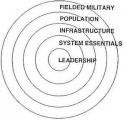
Originally Posted by
wmthomson

It would seem that if you assign to an Insurgency the unique attribute of requiring outside support (which is a very interesting idea) then size plays an important role in differentiating the two, in that, outside support is only really sought for two reasons, a lack of material or ideological support internally. Either way they are both the result of not having enough popular support internally to maintain the fighting force or recruit enough fighters. This necessary minimum level of internal support to sustain the fight might be what Dr. Sambanis is getting at when he talks about size and having popular support etc.
This leads me to thinking (and this may have already been discussed) that perhaps the difference between Civil war and Insurgency is as simple as an insurgency is just a conflict that has not reached the maturity, or minimum sustainability, required of a civil war. They both exist on a spectrum of conflict resulting from internal discontent, one is just further along then the other if you will.








Bookmarks